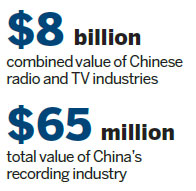

More than three decades of reform and opening-up have led to China's rapid development, including in some key sectors of the copyright industry that covers art, radio, film and television. A long debate on the issue continued during the recent China Broadcast Right Seminar held in Beijing, where participants called for legal protection for recording artists.
According to Guo Biao, the International Federation of the Phonographic Industry's chief representative in China, an international standard for broadcasting and public performance rights for sound recordings has been widely respected around the world since the Rome Convention of 1961 and the WIPO Performances and Phonograms Treaty of 1996.
At least 146 countries have recognized the standard and formalized it in legislation, most recently Indonesia. However, China has not adopted the standard to protect the broadcast and public performance rights of recording artists.
"From 1980 to 1996, China's record industry developed quickly and healthily. But with the fast development of the Internet in China since 2000, copyright violations of recording artists have been very rampant. It's very urgent and necessary to have broadcast and public performance rights protected by laws," says Guo.

Figures presented at the seminar showed that the combined value of Chinese radio and TV industries amounted to $8 billion in 2013, and the total value of China's recording industry was $65 million. Participants say that means Chinese broadcast industry can afford to pay broadcast royalties.
R Ramani Ramalingam, CEO of the Recording Industry Association of Malaysia, told attendees that broadcast royalties comprise about one-third of all record-producing revenues in Malaysia.
"Such royalties are key to the continued survival and development of the record industry which remains a very significant cultural and economic contributor in Malaysia," he says.
Wang Huapeng, head of the copyright department of China Audio-Video Copyright Association, says amendments of the Copyright Law made in 2001, to prepare for China's entry into the World Trade Organization, stirred the debate about broadcast rights of record artists. Remaining issues range from a fee-charging standard to how to charge the fee for broadcasting music at radio, TV stations versus public places, such as restaurants, shopping malls and karaoke bars.
"The huge business potential of the music industry also needs a legal atmosphere to protect recording artists' rights," says Guo.
"The latest statistics available show that the output value of the country's copyright industries accounted for 6.67 percent of GDP," says Lauri Rechardt, director of licensing and legal policy of IFPI. "The Chinese broadcasting industry is expected to grow strongly over the next five years to more than $11.5 billion."
chennan@chinadaily.com.cn